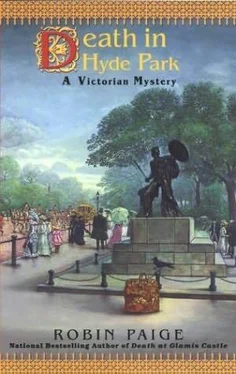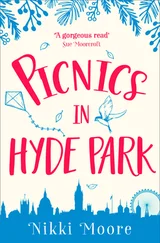Robin Paige - Death in Hyde Park
Здесь есть возможность читать онлайн «Robin Paige - Death in Hyde Park» весь текст электронной книги совершенно бесплатно (целиком полную версию без сокращений). В некоторых случаях можно слушать аудио, скачать через торрент в формате fb2 и присутствует краткое содержание. Жанр: Классический детектив, на английском языке. Описание произведения, (предисловие) а так же отзывы посетителей доступны на портале библиотеки ЛибКат.
- Название:Death in Hyde Park
- Автор:
- Жанр:
- Год:неизвестен
- ISBN:нет данных
- Рейтинг книги:5 / 5. Голосов: 1
-
Избранное:Добавить в избранное
- Отзывы:
-
Ваша оценка:
- 100
- 1
- 2
- 3
- 4
- 5
Death in Hyde Park: краткое содержание, описание и аннотация
Предлагаем к чтению аннотацию, описание, краткое содержание или предисловие (зависит от того, что написал сам автор книги «Death in Hyde Park»). Если вы не нашли необходимую информацию о книге — напишите в комментариях, мы постараемся отыскать её.
Death in Hyde Park — читать онлайн бесплатно полную книгу (весь текст) целиком
Ниже представлен текст книги, разбитый по страницам. Система сохранения места последней прочитанной страницы, позволяет с удобством читать онлайн бесплатно книгу «Death in Hyde Park», без необходимости каждый раз заново искать на чём Вы остановились. Поставьте закладку, и сможете в любой момент перейти на страницу, на которой закончили чтение.
Интервал:
Закладка:
“As it happens, Charles and I met him just last week,” Kate said, “at a party given by his British publisher.” She smiled at Nellie’s excitement. “He’s certainly a charming man, and extraordinarily good-looking.”
“He’s a Greek god,” Nellie said, rolling her eyes. “Sent from heaven.”
Kate wasn’t quite sure of that. She had certainly felt the magnetism of London’s charismatic charm-not a woman at the party could have escaped the allure of his personality-but she couldn’t help feeling that there was something of the rogue about him. She wondered if Nellie knew that he had a wife and young child back in California, but she didn’t like to interfere. Whatever lessons about life and love Nellie was to learn through her attraction to Jack London, they would have to be her lessons.
Kate stood. “Ask Hodge to bring the pony cart round to take you to the station,” she said. She put her arms around the girl in a warm embrace. “I wish you would visit more often, Nellie. It’s always a great pleasure to see you, and to hear about all your success.”
“It’s all due to you, Kate,” Nellie said simply, returning Kate’s embrace. She put out her hand to her friend. “I hope things work out, Lottie. You must let me know if I can help further.”
When Nellie had gone, Miss Conway stood too. “Thank you, Lady Sheridan,” she said soberly. “If I’m to stay, I’ll try my best not to be any trouble. I’m afraid I don’t have any money to give you, but I’ll be glad to work for my room and board.”
“There’s always plenty of work to be done around here,” Kate replied. She smiled. “Do you happen to know anything about doctoring sick calves?” When the girl shook her head, she said briskly, “Not to worry. But do come upstairs and I’ll find you something to wear. We don’t want to spoil that delicious white linen suit.”
Charlotte Conway’s father had been an engineer and her mother the daughter of a wealthy Lancaster button manufacturer. Her father had died when she was quite young, her mother had never taken much notice of her, and Charlotte had grown up in a large, well-appointed house in Fitzroy Square with all the comforts that money could buy and a squad of servants to maintain them. She found nothing intimidating, then, about Bishop’s Keep, either the imposing house and staff of servants, or the fine furnishings, or the surrounding park. And of course, a true Anarchist would never be at all impressed by the trappings of wealth, no matter how grand.
She was, however, reluctantly impressed by Lady Sheridan herself, for the woman was both self-confident and unselfconscious, seemingly without regard for her own wealth and possessions. Although she was not conventionally beautiful, she had a strong, striking Pre-Raphaelite face, with a resolute mouth, heavy brows, and decisive chin. Her eyes were an intense hazel-green that seemed to take nothing for granted, her thick auburn hair straggled untidily out of its knot on top of her head, and her hands were square cut and capable-looking, the nails rather the worse for wear-certainly not the hands of a titled lady or a famous writer. To tell the truth, they looked very much like the hands of a farmer.
And then there was the surprising business of Lady Sheridan’s School for the Useful Arts. For one thing, Charlotte had assumed that Bishop’s Keep, so convenient to the city, was merely a weekend country home, and she was taken aback to discover that it was a working farm, an extensive one, at that-and entirely under Lady Sheridan’s management. For another thing, she had no idea that a woman of such a high social standing would have any interest at all in the plight of the working woman. But there were more surprises in store.
After Charlotte had been outfitted in what her ladyship called a “working costume”-a simple, short-skirted blue dress topped with a smock, and a pair of leather brogans-the two of them went out for a tour. A little later, they were walking through the poultry yard, where a group of women was building a new chicken coop, and Lady Sheridan was explaining the purpose of her school and the idea behind it: to help young women acquire skills that they could put to work on the land, to create both productive lives and productive smallholdings.
And now, Charlotte was impressed, in spite of all her Anarchist learnings. Her fellow comrades had dinned it into her that no wealthy landowner cared a fig for those who worked the land, or cared only to keep them oppressed. But while Pierre would probably sneer at Lady Sheridan’s “reformist” notions and argue that her efforts were merely palliative, Charlotte could not but feel that the school was accomplishing something important, and said as much.
“It’s not enough, of course,” Lady Sheridan replied. “There are too many thousands who need help. But if what we’re doing here can keep even one young woman out of the factories and the slums, it will have been worthwhile.” Her smile became rueful. “I know about slums firsthand, you see, because I grew up in New York, in a tenement. I was an orphan, and my aunt and uncle O’Malley took me in and raised me. Uncle was a policeman, and Irish, and there were a great many mouths to feed.” She shook her head. “I sometimes wonder that we all survived. But we did, actually. Survived and thrived.”
Lottie stared, her surprise turning to a complete and utter astonishment. “You… you grew up in a tenement?”
Lady Sheridan’s hazel eyes regarded her thoughtfully, and her mouth softened. She took Charlotte’s arm and they began to walk toward the orchard, where three women were picking fruit from the heavily-laden trees. “I certainly did. I remember almost every day of it, both the good and the bad. And it wasn’t all bad,” she added after a moment. “Sometimes I think that adversity teaches us to be strong and resourceful. If I had grown up under different circumstances, with more privilege and fewer responsibilities, I might not have the strength and resilience I have now.” Her tone was reflective and matter of fact.
“But how did you-” Charlotte was puzzled. “New York is so far away and-” She stopped, unable to think of a polite way to frame the question.
Lady Sheridan paused at the edge of the orchard and leaned her elbows on the old stone wall. “How did I get from there to here? With my pen, I suppose you might say. You see, I was already earning my living as a writer when I discovered that my father’s sisters, my Ardleigh aunts-of whom I had no knowledge at all-lived here at Bishop’s Keep. I was invited to come to England and work as a secretary to my Aunt Sabrina Ardleigh, with time from my duties to do my own writing. When she and my aunt Bernice both died, I inherited this place.” ^5 She raised her head and gazed at the neat rows of trees and the field beyond, where a group was stacking hay. “Sometimes I find it difficult to credit my good fortune, Miss Conway. Perhaps that’s why I try to do what I can to change things.”
“I see,” Charlotte said, thinking that while her Anarchist friends would doubtless charge Lady Sheridan with the hypocrisy of the wealthy, her heart certainly seemed to be in the right place.
“And you, Miss Conway?” Lady Sheridan turned to face her. “How did you come to be doing what you’re doing now?”
Charlotte clasped her hands, hesitating. She liked Lady Sheridan and wanted to tell her the whole story, but it all seemed so complicated. She settled for a sketchy outline. “It was my mother,” she said finally. “She joined the Fabian Society in the 1880s, but she was more interested in Anarchism than in Socialism. So she left the Fabians and started the Clarion in 1891 and carried it on until five years ago. Then she… fell ill.” She looked away, thinking how difficult it was to describe what had happened to her mother, and to herself, over the past few years. “There was no one else to continue the Clarion, so I took it on. I felt it my… duty, you see. Both to my mother and to the cause.”
Читать дальшеИнтервал:
Закладка:
Похожие книги на «Death in Hyde Park»
Представляем Вашему вниманию похожие книги на «Death in Hyde Park» списком для выбора. Мы отобрали схожую по названию и смыслу литературу в надежде предоставить читателям больше вариантов отыскать новые, интересные, ещё непрочитанные произведения.
Обсуждение, отзывы о книге «Death in Hyde Park» и просто собственные мнения читателей. Оставьте ваши комментарии, напишите, что Вы думаете о произведении, его смысле или главных героях. Укажите что конкретно понравилось, а что нет, и почему Вы так считаете.












